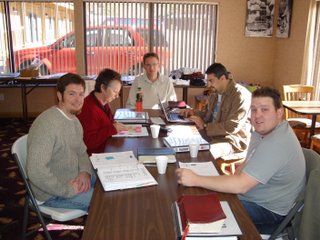
The root of the word discipline is disciple. You can’t be a disciple – or make disciples – without discipline. Engaging in spiritual disciplines creates an atmosphere in the heart where the Spirit of God gives birth to the fruit of the Spirit. It is through spiritual disciplines that we become strong in our spirits and learn to live by the Spirit (1 Corinthians 9:27). Spiritual disciplines include systematic Bible study, meditation, scripture memorization, disciplined prayer, fasting, rest, etc.
Sometimes we equate effort with works or the flesh. I’ve been influenced once again by Dallas Willard in this regard, but he says that while we cannot earn grace, that doesn’t mean it doesn’t take effort. By taking the time away from our regular ministry activity to practice spiritual disciplines we are demonstrating our faith in God. Spiritual disciplines and intentional discipleship may be the primary way we show that we are ministering by faith in the power of the Spirit because there isn’t always an immediate, tangible result. We wouldn’t take the time to memorize scripture or take a Sabbath rest unless we believed that what God does is more important than all the stuff we are able to do for Him. We want more of God and less of us. But it takes work to stop working in order to let God work! That’s where spiritual disciplines help us.
But just as discipline is essential to our own personal life of discipleship, discipline is also necessary if we are to make disciples. Making disciples doesn’t just happen. We need a plan (a strategy), and then we need to be disciplined to stick to the plan. Being disciplined means not only having a ‘to do’ list, but having a ‘not to do’ list as well. Are there things that you’re going to have to stop doing in order to make time for the discipling God has called you to do?
The energizing of the Holy Spirit, the guidance and teaching of the Scriptures, the will to be obedient, and a plan. These are the ingredients for a disciplined – and fruitful – life. What spiritual disciplines can you practice more deliberately this week?
Sometimes we equate effort with works or the flesh. I’ve been influenced once again by Dallas Willard in this regard, but he says that while we cannot earn grace, that doesn’t mean it doesn’t take effort. By taking the time away from our regular ministry activity to practice spiritual disciplines we are demonstrating our faith in God. Spiritual disciplines and intentional discipleship may be the primary way we show that we are ministering by faith in the power of the Spirit because there isn’t always an immediate, tangible result. We wouldn’t take the time to memorize scripture or take a Sabbath rest unless we believed that what God does is more important than all the stuff we are able to do for Him. We want more of God and less of us. But it takes work to stop working in order to let God work! That’s where spiritual disciplines help us.
But just as discipline is essential to our own personal life of discipleship, discipline is also necessary if we are to make disciples. Making disciples doesn’t just happen. We need a plan (a strategy), and then we need to be disciplined to stick to the plan. Being disciplined means not only having a ‘to do’ list, but having a ‘not to do’ list as well. Are there things that you’re going to have to stop doing in order to make time for the discipling God has called you to do?
The energizing of the Holy Spirit, the guidance and teaching of the Scriptures, the will to be obedient, and a plan. These are the ingredients for a disciplined – and fruitful – life. What spiritual disciplines can you practice more deliberately this week?
We put up our Christmas tree this week ...






